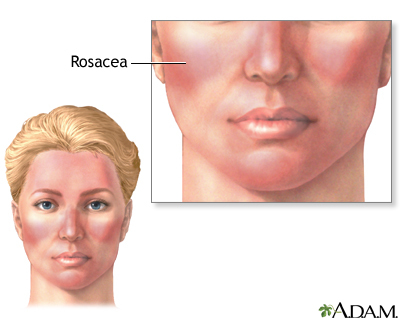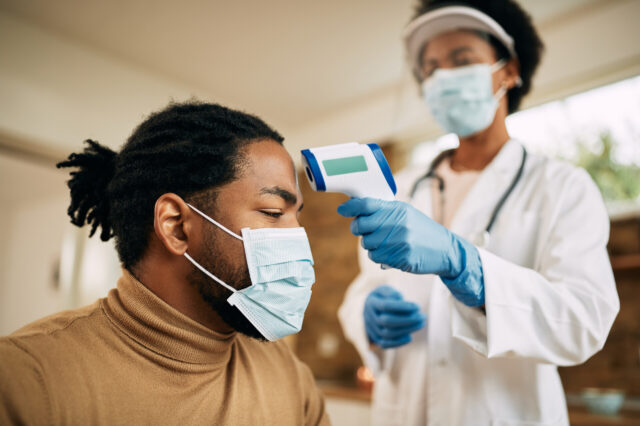Definition
Rosacea is a chronic skin problem that makes your face turn red. It may also cause swelling and skin sores that look like acne.
Causes
The cause is not known. You may be more likely to have this if you are:
- Age 30 to 50
- Fair-skinned
- A woman
Rosacea involves swelling of the blood vessels just under the skin. It may be linked with other skin disorders (acne vulgaris, seborrhea) or eye disorders (blepharitis, keratitis).
Symptoms
Symptoms may include:
- Redness of the face
- Blushing or flushing easily
- A lot of spider-like blood vessels (telangiectasia) of the face
- Red nose (called a bulbous nose)
- Acne-like skin sores that may ooze or crust
- Burning or stinging feeling in the face
- Irritated, bloodshot, watery eyes
The condition is less common in men, but the symptoms tend to be more severe.
Exams and Tests
Your health care provider can often diagnose rosacea by doing a physical exam and asking questions about your medical history.
Treatment
There is no known cure for rosacea.
Your provider will help you identify the things that make your symptoms worse. These are called triggers. Triggers vary from person to person. Avoiding your triggers may help you prevent or reduce flare-ups.
Some things you can do to help ease or prevent symptoms include:
- Avoid sun exposure. Use sunscreen every day.
- Avoid a lot of activity in hot weather.
- Try to reduce stress. Try deep breathing, yoga, or other relaxation techniques.
- Limit spicy foods, alcohol, and hot beverages.
Other triggers may include wind, hot baths, cold weather, specific skin products, exercise, or other factors.
- Antibiotics taken by mouth or applied to the skin may control acne-like skin problems. Ask your provider.
- Isotretinoin is a strong drug that your provider might consider. It is used in people who have severe rosacea that hasn't improved after treatment with other medicines.
- Rosacea is not acne and will not improve with over-the-counter acne treatment.
In very bad cases, laser surgery may help reduce the redness. Surgery to remove some swollen nose tissue may also improve your appearance.
Outlook (Prognosis)
Rosacea is a harmless condition, but it may cause you to be self-conscious or embarrassed. It cannot be cured, but may be controlled with treatment.
Possible Complications
Complications may include:
- Lasting changes in appearance (for example, a red, swollen nose)
- Lower self-esteem
References
Dinulos JGH. Acne, rosacea, and related disorders. In: Dinulos JGH, ed. Habif's Clinical Dermatology: A Color Guide in Diagnosis and Therapy. 7th ed. Philadelphia, PA: Elsevier; 2021:chap 7.
Kroshinsky D. Macular, papular, purpuric, vesiculobullous, and pustular diseases. In: Goldman L, Schafer AI, eds. Goldman-Cecil Medicine. 26th ed. Philadelphia, PA: Elsevier; 2020:chap 410.
van Zuuren EJ, Fedorowicz Z, Carter B, van der Linden MM, Charland L. Interventions for rosacea. Cochrane Database Syst Rev. 2015;(4):CD003262. PMID: 25919144 www.ncbi.nlm.nih.gov/pubmed/25919144/.



